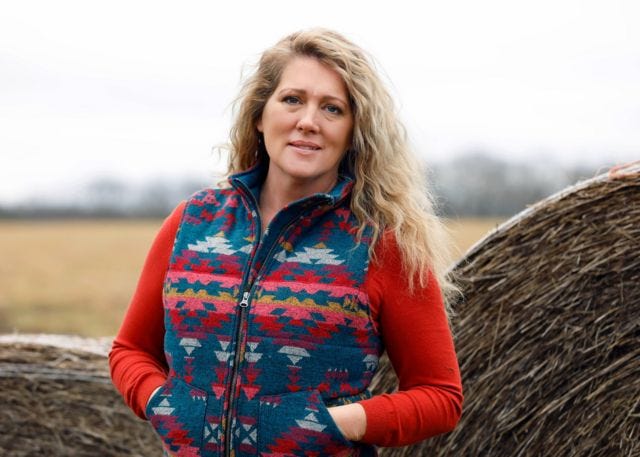Happy Friday!
Does anyone have any good tips for dealing with rage, other than going to live in a hole? (Even then I would probably be furious about the hole.) The news over the last few weeks has left me fuming, and not in a productive way.
Helen
PS. I promise my podcast tour is now at an end, but first here’s a quick hit on NPR’s All Things Considered, a longer conversation with Bari Weiss about whether the IDW was a real thing, and a video (horror) podcast with Andrew Gold on Russell Brand’s descent into conspiracism. I have now taken a vow of silence.
The Joy And Trauma of Carrying a Celebrity’s Baby (BBC)
“Shanna’s phone flashed. It was Catherine.
As Shanna remembers it, Catherine began without even saying hello: "Listen, I wanted to tell you before you see it in the news. I was using another surrogate and she has just given birth."
Shanna sat down to steady herself. Here she was in the early weeks of pregnancy, with Catherine's child. Except Catherine now had another child. This was the first time she'd heard that she wasn't Catherine's only surrogate. What did it mean? Would Catherine still want the baby Shanna was carrying?
"I wish you'd told me," Shanna managed to muster. "Should we talk after I've been for my check-up tomorrow?"
Catherine agreed and hung up.
Shanna texted Catherine a few hours later.
"I was a little bit taken aback with the news, but I'm so happy for you. Enjoy your baby. Let's talk after my check-up."
Catherine didn't reply. Nor did she call the next day.”
It’s no secret that I am extremely sceptical of commercial surrogacy—and this piece explains why very clearly. The difference in status, power and wealth between a celebrity and a surrogate makes the arrangement ripe for exploitation. This story unfolds like a nightmare—imagine realising you’re going to hand over the child currently growing inside you to an absolute loon.

The Internet Loves An Extremophile (The Atlantic)
Andrew Tate is another extremophile. The misogynist influencer, a former kickboxer and reality-show contestant, used to describe himself as an atheist, but he announced last year that he had converted to Islam because—as one interviewer, the British rapper Zuby, summarized Tate’s view—“Christianity is kinda cucked.” Once Tate decided that God exists—which he had deduced because evil exists, and therefore so must its opposite—it was important to him to find the religion he deemed the most hard-core. (After all, a man who keeps swords in his house could not have become a mild-mannered Episcopalian.) On the other side of the gender divide, Mikhaila Peterson, a second-generation influencer who became known for advocating a “lion diet” as a cure for immune conditions, revealed in 2021 that she had found God through taking psychedelics. She now talks about religion healing her soul with the same intensity that she speaks about her all-meat diet healing her body.
I wrote something to develop an observation from The New Gurus—that many oped columnists, YouTubers and internet gurus are united by their “flexible evangelism.” It’s a combination of innate edgelordery and the desire to hold the social role of preacher, I think: “The extremophile model helps us make sense of political journeys that are otherwise baffling to us, like the monastery-to-pick-up-artist pipeline.”
Boomers and the Ultimate Failure of Thatcherism (Comment is Freed, Substack)
The smarter analysts in the party can see an existential threat heading towards them in the form of millennials who are not becoming more Tory-aligned as they get older. Yet any hope of avoiding wipeout in next year’s election depends on retaining the support of retired voters. They are polling in the mid-teens amongst people under 50; are behind Labour amongst those aged 50-65; yet retain a strong lead with those over 65.
But this is where the moral failure of Thatcherism becomes apparent. The very group of people she enriched, by giving them property, increasing the value of it, helping them become shareholders, allowing them to keep more of their income, have not become vigorously self-reliant, leading to a resurgence in entrepreneurial spirit, dynamism, and charity. They have become spectacularly entitled. (I shall pause briefly here to note I am talking about averages here and there are no doubt many lovely and self-aware boomers reading this, not least my business partner/father).
Sam Freedman’s conclusion here is that British politics is stuck because it refuses to accept we need to deal with wealth inequality between the old and the young. Inject it into my millennial veins.
Quick Links
“Though things may look rosy now, I’d advise the neponanists to add another string to their bows. When you’re young you’ll get commissioned for talking about sex, but a middle-aged masturbator is nowhere near as marketable.” Julie Burchill on the “nympho nepo daughters” (Spectator).
“I asked an ancient British tourist why he came here for his holidays. He said, “The staff will hold your dick if you ask them.” That is what Westerners like about Dubai: the indentured servitude. And the weather.” Tanya Gold on Beyoncé getting $24m to promote tourism in Dubai by playing a concert there (The Free Press).
I’ve seen some rum things in the London property market, but this £9m flat at the top of St Pancras has a £60,000-a-year service charge (Zoopla).
The tax lawyer Dan Neidle runs through how the Nadhim Zahawi story was broken—what comes across here is what a group effort it was (Twitter). It took the combined efforts of leftwing papers, the Sun, the FT and him to get past Zahawi’s denials and legal threats.
“C.G.I. will be very embarrassing in the future. Every action movie has the same stupid monster with the glowing embers under the skin, and it just gets ridiculous. I don’t know if other people see it the same way, but I feel like C.G.I. is inevitably going to look so dated.” The things we might cringe at in the future (New York Times).
One of the nicest things I’ve seen this week is Alex Massie giving a shoutout to the policy collective MurrayBlackburnMackenzie for their incredibly useful resources on gender reform, and James Kirkup crediting a load of women for the same (including me). I first wrote about the potential issues created by self-ID in prisons seven years ago—seven!—and received equal amounts of being attacked as a bigot by internet loons and… just being ignored by male peers who thought this issue was beneath them. But not these chaps. Having Alex and James writing regularly on this subject from a moderate, policy-oriented position has been invaluable.
“Wishful thinking can’t change gravity. In 1997, the Tories came into an election with a popular leader, a growing economy, and an optimistic manifesto looking to invest in public services they knew they had neglected. It didn’t work.” (Joxley, Substack). John Oxley argues that things are incredibly dire for the Tories and people haven’t really acknowledged that yet. I guess political journalists are reluctant to go “a 25-point lead, strewth” a) in case it magically reverses and they look stupid; and b) it makes covering the next election very boring if there is absolutely no jeopardy.
“Fast forward a few years and the New York Times is running nuanced articles about youth transition and ‘Defund the police’ is widely accepted to be electoral hemlock. Yet I still hear a note struck on heterodox podcasts such as Triggenometry that the critique they offer remains unspeakable in progressive circles.” James Harris is right here; the “anti-woke” sphere is now far bigger than the “woke” one but it’s stuck playing the same tunes because its whole schtick relies on claiming underdog status (Stiff Upper Quip, Substack).
“For Hancock and Johnson, Brexit, which was once about farmers and fishermen and the NHS, now turns out to always have been about vaccines. It’s a rewriting of the original story as comprehensive as Sherlock Holmes explaining that he was only pretending to be dead, but it works for them.” Rob Hutton on this week’s third anniversary of Brexit (The Critic).
“Two parents were searching for their missing 23-year-old daughter in Germany when they came across a grisly discovery — her parked car with a dead woman in the back seat. They called the authorities and watched as the body of their daughter was removed from the car. Except it wasn’t their daughter — it turned out to be another woman, who looked extremely like her. And their daughter was suspected of murdering her — potentially to fake her own death, police and prosecutors say.” Those scorchmarks you see are 93 people trying to be the first to turn this into a true-crime podcast (Washington Post).
“Scotland suffers from an incestuous political culture in which policy is researched, lobbied for, drafted, legislated, reported on and analysed by people who all used to drink together down the student union. It is government of old uni mates, by old uni mates, for old uni mates.” (Spectator) Stephen Daisley on the SNP’s woes, which echoes what I heard when reporting in Scotland in 2021—outside Sturgeon’s favour, life is very chilly indeed.
Apparently Substack is now including a button down here to allow you to “pledge” for this newsletter, which would convert to a paid subscription if I switched on that option. I’m curious—what to you would be worth paying for? Extra subscriber-only posts? A subscriber-only podcast? Or something else? Hit “reply” or leave a comment.





I'm torn by this. I really love that you give us a free newsletter each week - and I love the newsletter itself. In a world where everything can be monetised, it's great that you have chosen only to share what you find interesting, curious or thought-provoking rather than charge for it directly. It gives the Bluestocking a level of authenticity.
Clearly producing the newsletter week-in, week-out takes time which you could be using to earn actual money, rather than just applause from spoddy liberals. My worry wouldn't be paying so much as it might change the way you go about putting the newsletter together - and I'm aware that this sounds like the worst sort of dissembling - would there be more of an effort to chase likes? Are there subjects (I bet there bloody are, who am I kidding?) which would bring in more subscribers? Would subscribers feel they have more ownership of the newsletter and start pressuring you to include certain stuff (maybe they do that already)?
In short: yes, I'd be prepared to pay. But I'd also be ready to spring on every linked story that didn't interest me and probably every typo as a sign that the Bluestocking wasn't as good as it was back in the day.
I just subscribed to the Atlantic ($60) because I’ve been interested 4+ times in clicking through to articles you share (mostly by you). That felt like a worthwhile next step. I love your newsletter and would now pay for it but if you have to pay right from the start would I have learned that? I think Ian Leslie’s approach of the top bit for free and the part below the fold for subscribers could be a good model for you. Gives you multiple and cumulative opportunities to entice to paid. Similarly David liebovitz where I have recently moved from free to paid (to listen to a cheese tasting podcast!)